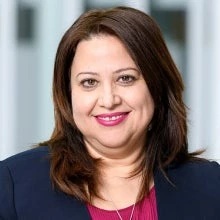Infrastructure has the power to transform lives. New roads and transmission lines, telecommunications networks, and public transit systems, both physically remake the landscape and have a dramatic effect on the everyday lives of ordinary people. In some cases, these projects can affect communities in unwelcome ways.
As the world recovers from the pandemic, there is a tremendous opportunity for emerging markets to make infrastructure investments that could create a greener future and more connected, prosperous, and resilient societies. For that to happen, however, infrastructure development must be based on a foundation of trust.
In order to ensure that infrastructure development has the largest possible positive impact, we must close the digital divide. Industry and government alike must ensure that marginalized voices are heard, operations are ethical, and decisions are open and transparent. And communities must share in the benefits of infrastructure development. Data can play a critical role, capturing people’s needs and preferences in the design of infrastructure projects. So can efforts to enfranchise and upskill young people and women — including promoting STEM education, particularly for girls and young women in developing countries.
These key themes will be discussed at IFC’s global infrastructure event, the virtual Sustainability Exchange, on June 9.
We see opportunities everywhere. For example, as COVID-19 has accelerated the pace of digital adoption, the world’s digital infrastructure is racing to catch up. Consider that in 2020 alone, global internet traffic grew by about 50 percent, while bandwidth capacity only increased 35 percent. Reliable electricity, towers, data centers, networks — all are needed to close the digital divide, ensuring equitable and affordable access for the poor and boosting economic growth.
Technology can help infrastructure companies operate inclusively and sustainably, to truly deliver on their transformational promise while earning stronger returns on investment. In markets in need of more bandwidth like Sub-Saharan Africa, expanding internet access to reach 10 percent more people could increase GDP by up to 4 percentage points, according to recent IMF research.
We’re also seeing how technological innovations are speeding up the transition to clean energy, addressing climate change, and offering a viable path for energy companies in the new green economy. The shift to renewables creates a multiple-win, people-focused scenario for developing countries as well. In addition to decarbonization, renewables such as off-shore wind are increasing power supply and expanding energy access. Other technologies, such as small, off-grid solar installations, offer transformative potential to electrify rural areas and support local small business development. And the sector is responsible for notably gender-inclusive job creation: In 2020, renewables created 11.5 million new jobs, 32 percent of which went to women — better gender balance than comparable sectors.
Other infrastructure sectors stand at an inflection point as well. As suppliers of modern technology’s foundational components, critical mineral companies are in the spotlight as never before. Here too — as with other infrastructure sectors — open and verifiable data can help facilitate participation and promote transparency. Engaging with communities and supporting their development needs can increase trust and ensure project success.
Cities and urban populations are also benefiting from trust-centered and technologically advanced infrastructure development. For example, data insights on the flow of people and goods can enable more effective community participation in urban planning. And digitally-enabled ride-sharing and micro-mobility services (think e-scooters and bicycles) can equalize urban transport, solving the so-called “last-mile” problem to connect underserved communities with mass transit and representing a way to shrink transit deserts. These innovations contribute to infrastructure that is inclusive and equitable.
And yet, there are risks and downsides. While technology can serve as a force to build trust and connect societies, many trust issues are directly related to concerns about people’s rights in the new digital world. These include lack of transparency on use and protection of personal data, concerns about cybersecurity, and bias in the human-coded algorithms that underpin AI. In addition, the regulatory environment has yet to catch up. Protections and redress mechanisms are few, making it difficult for citizens to hold companies and governments accountable. Low levels of digital literacy and limited access to services, combined with viral social media posts that create a groundswell of misinformation and disinformation, all contribute to a loss of trust.
We know there is a massive opportunity to unlock markets by using technology to build trust and lead with integrity, beginning with project design. We also know that the we must handle these risks and challenges or they will threaten market development.
These issues are too big for the private sector, governments, regulators, or civil society to solve alone.
So let’s work on them — and explore the opportunities — together. Please join us virtually on June 9 as we look at the transformational, trust-centered opportunities for infrastructure companies in the digital economy. Engage and network with the global infrastructure community: Register here.




Join the Conversation